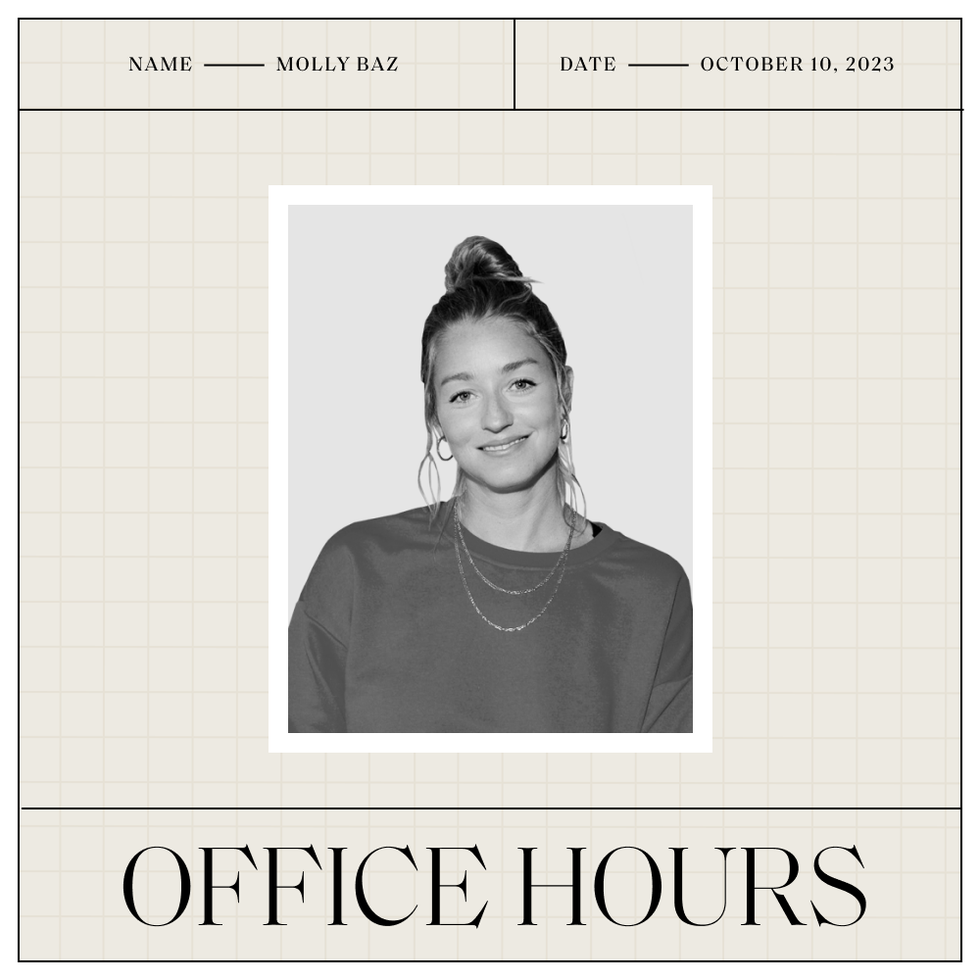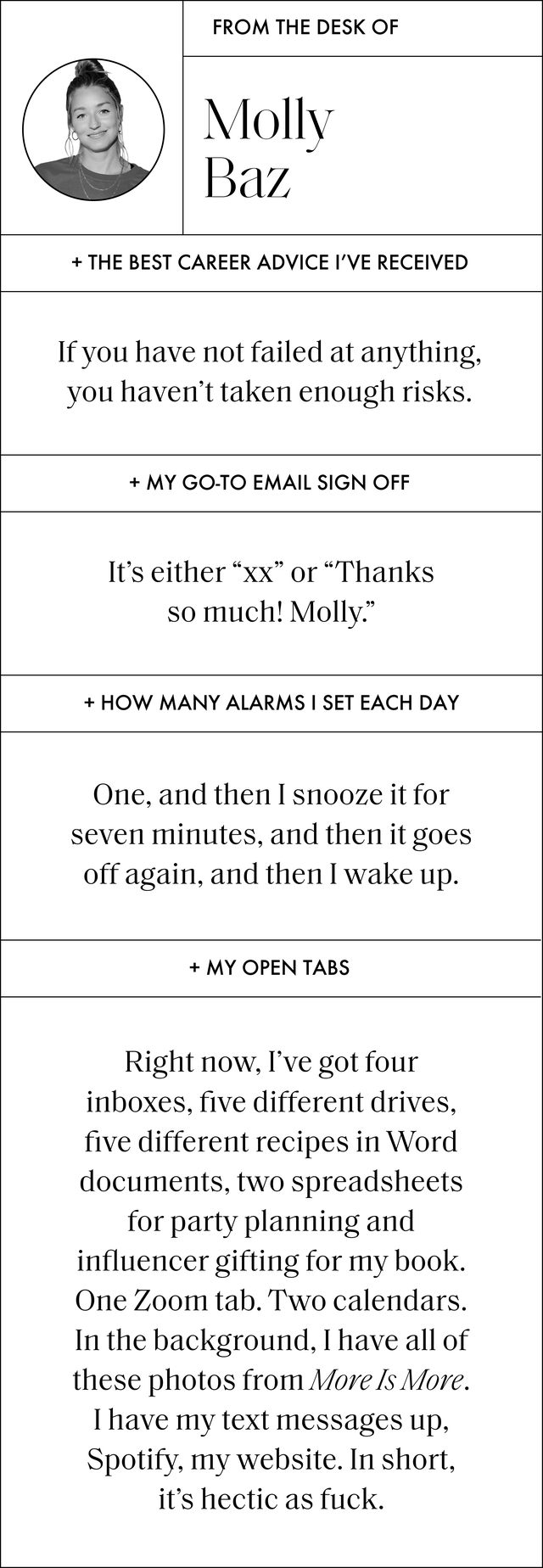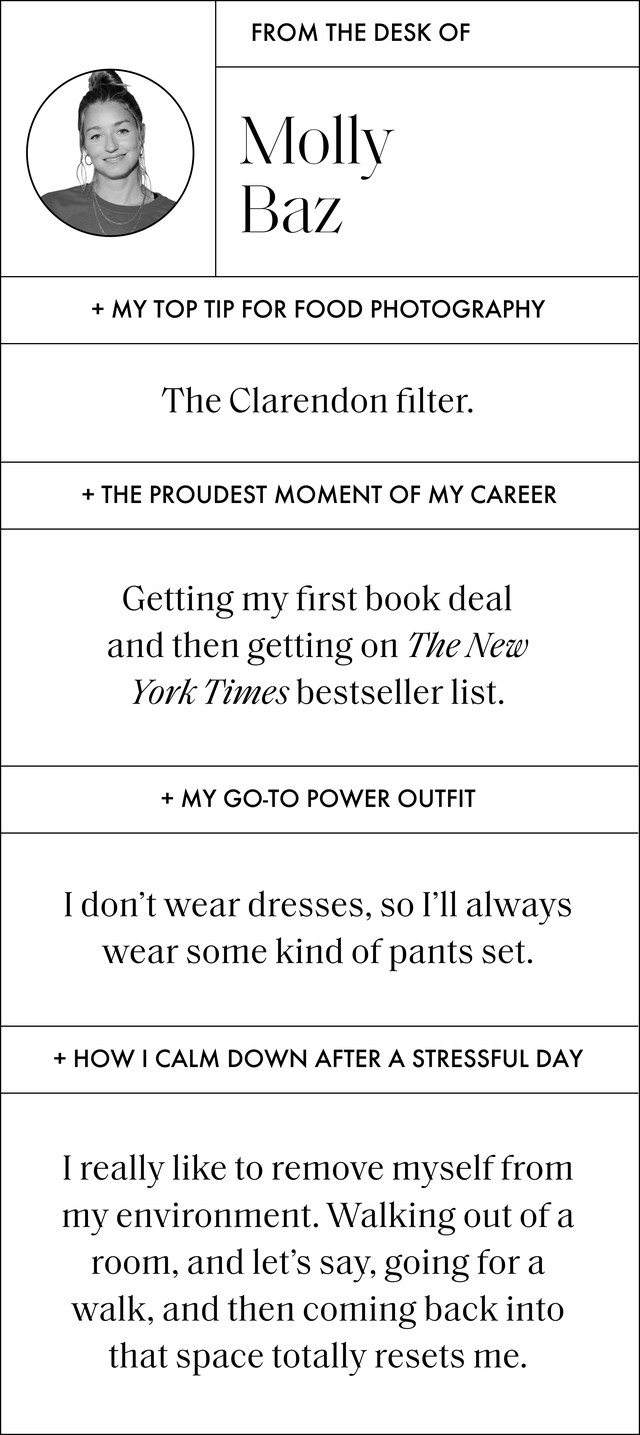How Instagram’s Favorite Chef Molly Baz Turned Viral Fame Into a Namesake Brand
In ELLE.com’s monthly series Office Hours, we ask people in powerful positions to take us through their first jobs, worst jobs, and everything in between. This month, we spoke to Molly Baz, a pro chef and best-selling author who just released her new cookbook, More Is More. Baz first built a loyal following while working in Bon Appétit’s test kitchen and appearing on its viral YouTube page, but after a reckoning at the magazine in 2020, she struck out on her own and has since churned out two cookbooks, a recipe club, a line of wines, and even a Crate & Barrel collection. Below, she shares what it was like to go from anonymous editor to mini celebrity and how she’s moved forward with a single mission in mind: teaching you how to be a better cook.
My first job
My first job was waitressing at a barbecue restaurant in my hometown when I was about 16. I ate so much fucking cornbread in the year that I worked there. How have I not been able to figure out how to make a cornbread that’s as moist and tender and delicious as the one that was at that restaurant? I need to go on a journey to recreate it.
How I fell in love with cooking
In college, I was super passionate about languages and art history, so I did a study abroad program in Italy. I lived with a family instead of living in an American dorm, and that’s when I really became exposed to home cooking for the first time. I stayed with this woman named Graciela who was 75, 80 years old. She would go to the market every day and then cook something fabulous at night—fabulous in the very un-fabulous way Italians cook, which is so rustic, so simple, [with] so much olive oil. I took the opportunity to learn from her and wanted to know everything. I was like, “Whoa, wait, could you tell me what kind of carrots those are?” and she would always be like, “Oh Molly, you’re so crazy.” That obsession around Italian food turned into a general obsession of needing to know how to cook everything.
Why I got burnt out working in restaurants
I was working in a restaurant where I ended up dating the sous-chef, and the environment started to become my whole life in a way that was pretty alienating. I just was so, so, so caught up in this family we had created, which was the most beautiful thing—but it also felt like it didn’t exist in the real world. We were working together at a place where our hours were completely different from everyone else’s. It felt isolating, and I wanted to figure out how to integrate into the world a bit better. Working in restaurants is a really hard life and a really inconvenient life. The burnout was just literal exhaustion. I asked myself, “What path do I want to go down? Do I want to be the head chef, executive chef, owner of a restaurant someday?” When I couldn’t answer the question in the affirmative, because it didn’t feel like exactly the right fit for me lifestyle-wise, then I was like, it’s time to pivot.
The most important lesson I learned while working at Bon Appétit
How powerful collaboration is. I feel like all of us were better cooks in that environment, because we were bouncing ideas off each other and being sounding boards for all these other talented cooks. Being around like-minded creatives is so important for staying inspired and doing your best work. It’s a lot harder to do when you’re just a solo act, like I am now. It’s the thing I cherish the most about that time.
What it was like to suddenly be recognized everywhere
It started on the subway, because I would take the train to the World Trade Center [where the Bon Appétit offices are located], and without fail, every morning, there would be someone on the train who was like, “Oh my God, are you…?” Then I would sit and have a conversation with them. I remember being so out of sorts by it all. I cannot stress enough how strange it is to go from being anonymous to a known entity in the world. It’s something I think about a lot, and I frankly don’t know how I feel about it still. It’s amazing 90 percent of the time, and I get the most incredible feedback and love from random people, which most people never experience. Then there’s this 10 percent, which is knowing that you are never alone in the world. It’s such a strange feeling. There’s something so liberating about being anonymous and being able to just walk into a store and know that, unless you see a friend, no one has any idea who you are. Thankfully, I’m not like, Beyoncé, so it’s not every day, but I never know if I’m being seen, watched, stared at, or recognized, because people don’t always vocalize it. As a result, I don’t really ever feel anonymous in the world. If you sit with that, it’s pretty wild.
Why I decided to leave Bon Appétit
It was a very particular moment for Bon Appétit, for America at-large. What was best for Bon Appétit and for me was for me to not be there anymore, frankly. For me to be constantly pitching ideas, that wasn’t the voice that needed to be heard in the room anymore. I was occupying a space that is so coveted; there are maybe five people in the test kitchen. For so many reasons, compounded with the fact that I had a book coming out, I was like, “This is the right moment to leave, start a new chapter, open up a new spot in the test kitchen.” But I definitely didn’t have a huge game plan. I woke up a few days later and was like, “Oh my God, wait, what am I doing all day long now? Where are my recipes living? How are people going to cook my food? I have to wait until my book comes out. That’s so long. Do I not develop a recipe until then? This is so strange. This is what I do all day.” That’s when I started my newsletter, because I had to fill my time and exercise my creative brain in the kitchen.
My strategy for starting my brand
What’s most important to me is that I teach people how to cook—not that I make food that looks yummy that no one ever makes or that people know I know how to cook. I want you to know how to cook. I want to make sure that when I leave this Earth, I’ve impacted many, many, many human beings for the better and have allowed them to find comfort and joy in the kitchen and in the process of putting a meal on the table. When I started thinking about building my brand once I left my job at Bon Appétit, the first thing that popped into my head was: I feel like I’m a teacher, and everyone is a student. And the primary colors are the first thing you learn in kindergarten. It’s blocks and graphic shapes and primary colors. It was never even a question. I was like, “That will be what we build this brand on.”





